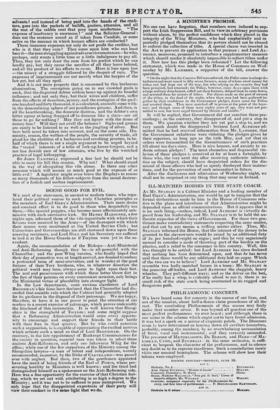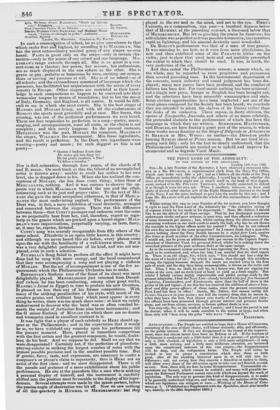PHILHARMONIC CONCERTS.
WE have heard some few concerts in the course of our lives, and out of the number, about half-a-dozen claim precedence of all the rest. The concluding Philharmonic of this season may fairly make that number seven. It was beyond all question one of the most perfect performances we ever heard ; and although there is one name in the scheme which ought not to have found admission, it was but a speck on a mirror of exquisite polish. The Directors seem to have determined on bearing down all cavillers (ourselves, probably, among the number), by an overwhelming accumulation of force, vocal and instrumental ; and they certainly succeeded. The presence of MENDELSSOHN, DE BERIOT, and Heitz—of MA- LIBRAN, CINTI, and ZUCHELLI— in the same orchestra, is suffi- cient to bespeak the character of the performance, and to silence any doubt as to its superior excellence. Such a constellation rarely visits our musical hemisphere. The scheme will show how their talents were employed.
EIGHTH CONCERT—MONDAY, JUNE 10.
ACT 5.
Sinfonia, No.4 BEETHOVEN. Aria Signor ZIICHELLI, Melthe ti lascio" MOZART. Concerto. Pianoforte, 31, HERZ Hsu. Sena, Madame MALIBRAN." Non pia di fiori," Como di bassette oblige°, Mr. WILLMAN MOZART. Overture, composed expressly for the Philharmonic So- ciety, and first time of performance . ... F. MENDELSSOHN BARTHOLDT.
ACT it.
Sinfonia in G minor MOZART.
Aria, Madame, CINTI DAnDREAD, " Sento un luterna voce," Eijiabetta Rossnrt. -First Concerto Violin, M. DE Hamm DE BERIOT. • TheettO, Madame CINTI DAVDREAU and Madame MALT BRAD, " Vann°, se alberghi in keno," Anaronito MERCADANTE. -Overture. Egmont BEETHOVEN. Leader, Mr. WE MOSEL Conductor, Mr.
In such a ooncentation of talent, let us give precedence to that
'which ranks first and highest, by awarding it to MALIBRAN. She bas the most extraordinary musical grasp of any singer we ever heard. PASTA iS great only on the stage—only- in certain cha- racters—only in the music of one school and one language. MA- LIBRAN'S range extends through all. She is as great in a con- cert-room as a theatre; her power, her science, her enthusiasm, are as much displayed in the one sphere as the other. She is . grave or gay, pathetic.or humorous by turn, exciting our sympa- thies or moving our passions at will. She is of no school—or of all schools; and the extraordinary command of language which she
possesses, has facilitated her acquaintance with the music of every
country in Europe. Other singers are restricted in their know- ledge to such compositions as happen to be conveyed into their vernacular tongue by means of translation; but to her the music of Italy, Germany, and England, is all ,native. It would be diffi- cult to say in which she most excels. She is the best singer of HANDEL and MOZART living, and with all the exuberancies of .Rossisri she sports most gracefully and at ease. Her Scene, this evening, was one of the perfectest performances we ever heard. There are four requisities to perfection in a song--poetry, music, singing, and accompaniment, must all unite, or the charm is not complete ; and this rarely happens. In the present instance, METASTASIO was the poet, MOZART the composer, MALIBRAN the singer, WILLMAN the accompanist. Mix these ingredients, and the result is perfection.. In the Duet, two ingredients were wanting—poetry and music ; for such .doggrel as this is not poetry-
" Quanto e Barbaro it roma fato Ah restar pia non degg 'io ! Da lui grazia imploro, o Dio ! Vil felice a trionfar."
Nor is dull reiteration, through four pages, of the chords of E and B, music. On such trash as this the talent of an accomplished artist is thrown away : unable to exalt her author to her own level, she is dragged down to his. When she has realized the con- ceptions of MOZART, she has done every thing; when those of MERCADANTE, nothing. And it was curious to observe the op- posite way in which MALIBRAN treated the one and the other, estimating each at its just and proper value. To the text of Mo- ZART she gave the most scrupulous adherence, to that of MERCA- DANTE the most undeviating neglect. The performance of the Duet was, in fact, a mere exhibition of vocal dexterity, arranged and concerted between the- singers. There was this difference between them—that CINTI'S passages and cadences were the same as we perpetually hear from her, and, therefore, expect as regu- larly as the graces which are pricked upon a barrel-organ : MALI- BRAN'S were improvisations, perpetually varying, as taste, fancy, or, it may be, caprice, dictated. CINTI'S song was scarcely recognizable from fifty others of the
same school. Elisabetta is an opera little known in this country ; and although we never heard this air before, every phrase came upon the ear with the familiarity of a well-known strain. But it was a very delightful performance of its kind, and was not mis- placed, even in such a selection.
ZucHELet's Song failed to produce all the effect it might have 'done had he sung with more energy, and the band remembered that they were accompanying a song and not playing a sinfonia of Mozart's. But the art of accompaniment is one of the few ac- quirements which the Philharmonic Orchestra has to make. BEETHOVEN'S Sinfonia (one of the finest of its class) was most
delightfully played. MENDELSSOHN just returned from Dussel- dorf (where he has been conducting, among other great works, HANDEL'S Israel in Egypt) in time to produce his new Overture. It pleased us less than any of his former compositions. With many of the striking peculiarities of his style, with much of the creative genius and brilliant fancy which must appear in every thing he writes, there was too much sheer noise : at least we vainly endeavoured to discover why the band was so often crushed be- neath the weight of fortissimi from nine brass instruments : and the G minor Sinfonia of MOZART (in which there are no drums and trumpets) stood in excellent contrast to it.
It was right that a player of such celebrity as HERZ should ap-
pear at the Philharmonic ; and in the expectation that it would be so, we have withheld any remarks upon his performance till the present moment. Here, placed in immediate competition with the first artists and the greatest composers, he would, doubt- less; do his best. And we suppose he did. Shall we say that we were disappointed ? Certainly not, if the perfection of pianoforte- playing consist in striking the largest number of notes with the utmost possible precision and in the smallest possible time. But if genius, fancy, taste, and expression, are necessary to confer a composer's or player's claim to superiority, then is HERZ not an artist of the first class : and we were disappointed. There is all the parade and pretence of a mere exhibitionist about his public performance. He sits at the pianoforte like a man who is making a personal display of himself, and the instrument is carefully shifted into the position most favourable to the display of his leger- demain. Severalattempts were made by the music-porters, before the precise angle of observation was hit off. Now we saw nothing of all this quackery in HUMMEL or MEsnesessoam: but they played . to the ear and to the mind, and not to the eye. Ileez's Concerto, as a composition, was poor—a hundred degrees below that of HUMMEL at the preceding ccncert, a thousand below that of MENDELSSOHN. But let us give him the praise be deserves; his articulation was as perfect as it was possible to conceive, his execution rapid as lightning, and his manual dexterity most wonderful. DE BERIOT'S performance was that of a man of true genius. It was amusing to see how, as it were from mere playfulness, he now and then exhibited some of' the PAGANINI tricks on the violin; just to show that good taste and not inability prescribed the extent to which they should be used. It was, in truth, the very perfection of the art.
And thus ended the Philharmonic season; a season which, on the whole, may be regarded as more propitious and prosperous than several preceding ones. In the instrumental department of the concerts, much industry and sound judgment has been dis- played; many new pieces have been produced, and the number of failures has been few. For vocal music nothing has been achieved not a single new piece, foreign or English has been brought out, and the selections have been miserably commonplace and stale. Some obvious opportunities have been neglected : not one of the vocal pieces composed for the Society has been heard; we conclude they are intended to adorn the shelves of its library rather than the desks of its orchestra. There repose, in dusty oblivion, the operas of Euryanthe, Jessonda, and others of no mean celebrity, the pretended obstacle to the performance of which has been the language in which they are written. SCHROEDER, HAITZINGER, and DOBLER, are here during a great part of the season, to whom these works are as familiar as the Siege of Belgrade or Artaxerxes to BRAHAM or Mrs. Woon : no matter—the Directors prefer hearing RuBINI shout or Puzzi scream. But we are tired of ex- posing such folly : only let the fact be clearly understood, that the Philharmonic Concerts are carried on to uphold and improve In- strumental and to degrade Vocal Music.























 Previous page
Previous page